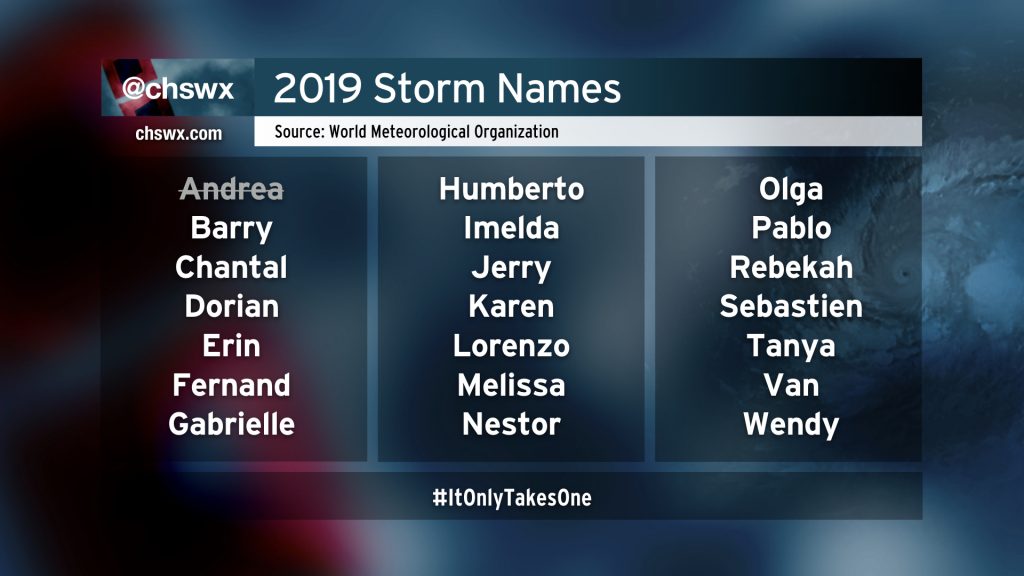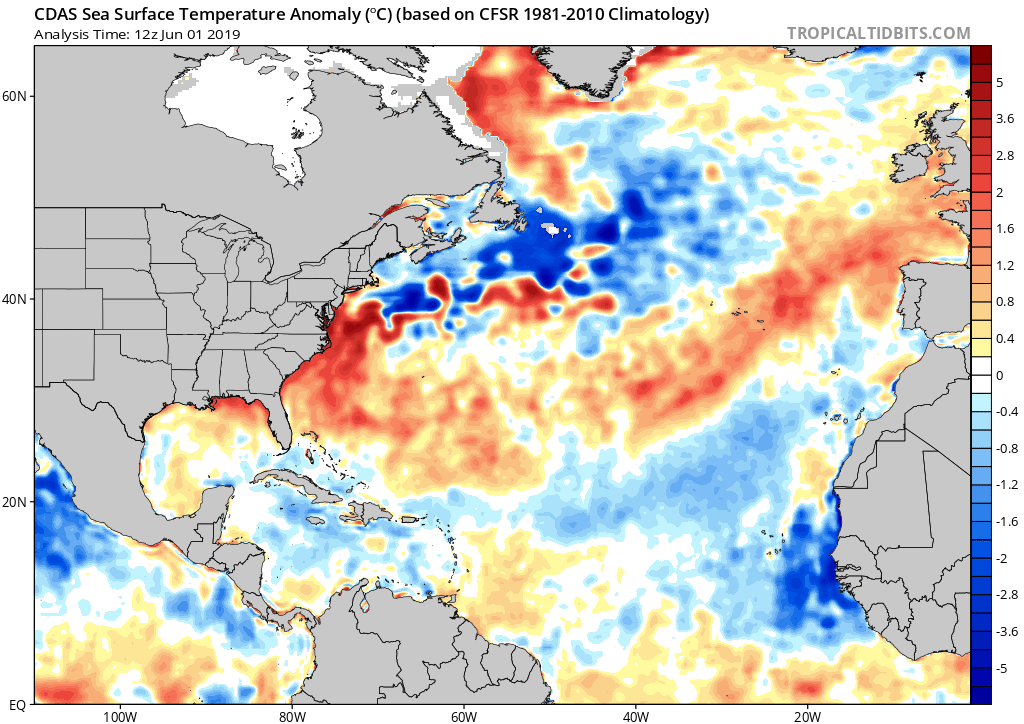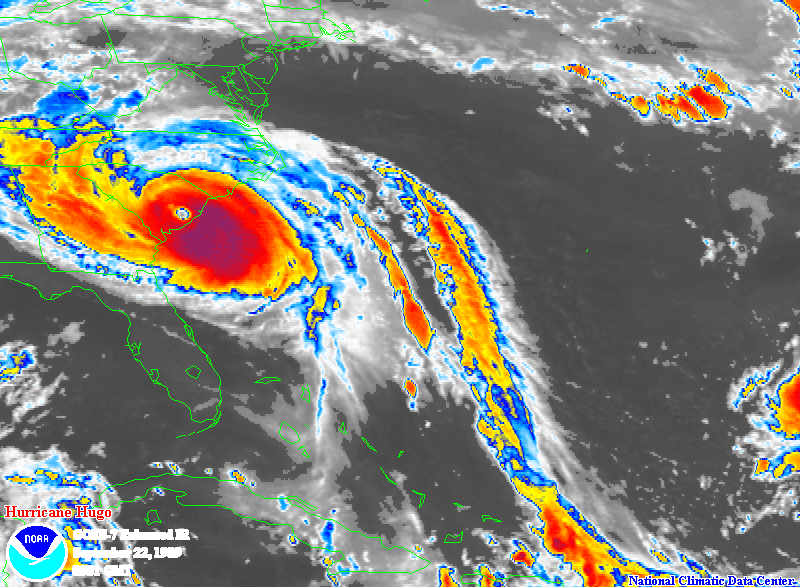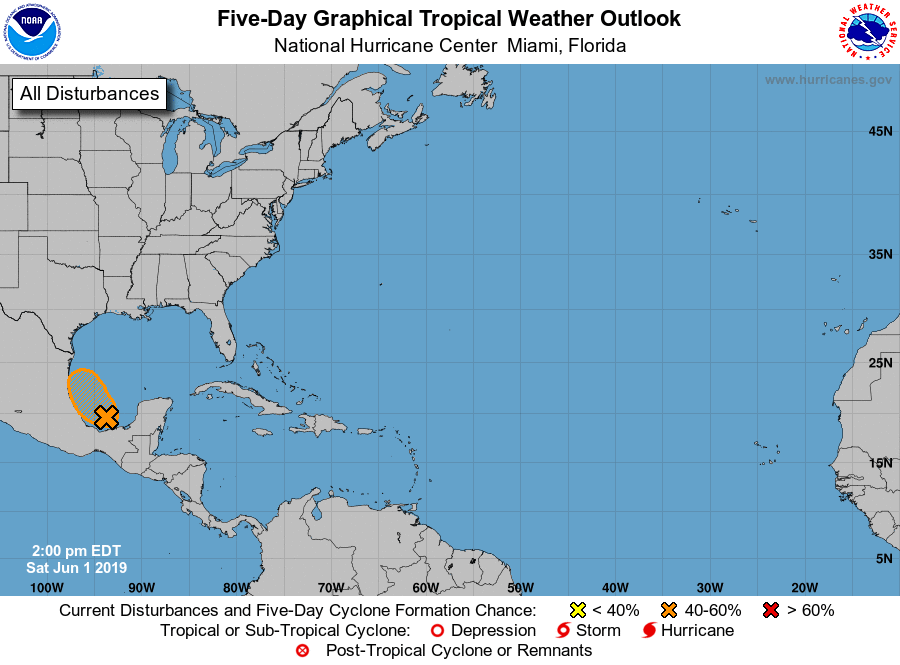The Atlantic hurricane season begins today

Welcome to the 2019 Atlantic hurricane season, which begins today (June 1) and lasts through November 30. This is the climatologically favored time for tropical systems to develop in the Atlantic basin (though we have had our fair share of May storms, including Subtropical Storm Andrea a few weeks ago). A fact of life of living in the Lowcountry — which is a really wonderful place! — is that we are susceptible to tropical cyclones, and as such, must be prepared for the possibility that one may approach the area.
This season’s outlook

NOAA and Colorado State researchers generally concur that we are looking at a near-normal, if not slightly below-average, hurricane season. The presence of a weak El Niño tends to set up unfavorable wind shear in the Atlantic. However, this could be counteracted by warmer-than-normal sea surface temperatures, especially if El Niño weakens as the season progresses.

Source: Levi Cowan/Tropical Tidbits
I like to message these seasonal outlooks as tools for meteorologists to determine how much Xanax to have on hand during the season, and not much else. Ultimately, it only takes one poorly-placed storm to make a hurricane season a bad one. So, regardless of how busy a given tropical season is predicted to be, it’s always important to have a hurricane plan.
Recent tropical systems affecting Charleston

Source: National Weather Service
Over the past few years, we have had quite a few brushes with significant tropical cyclones. Matthew in 2016 was the strongest of these storms, bringing hurricane-force wind gusts, very heavy rain, and significant tidal flooding to the Charleston coastline. 2017’s Irma, despite making landfall hundreds of miles to the west in the Florida Panhandle, still brought significant rainfall, flooding, and tornadoes to Charleston. Even storms that don’t make landfall can have significant effects on our region, as evidenced by the 2015 flooding event. During this event, a moisture tap from Hurricane Joaquin, which was several hundred miles off the U.S. East Coast, combined with a strong upper-level system to drive record rainfall and historic flooding in the Carolinas.
One cannot have a discussion about hurricanes and Charleston without mentioning the city’s benchmark storm, Hurricane Hugo, which made landfall at Sullivan’s Island as a Category 4 storm 30 years ago this September, doing significant damage and setting records for storm surge and tides for the Charleston area. Hugo remains the worst tropical cyclone hit Charleston has taken in recent memory.
Managing storm anxiety
Hurricane season is a stressful period for many of you. It is important to balance the need to stay informed about potential tropical threats with the need for ensuring the maintenance of your mental health. Storm anxiety is absolutely a real thing — in fact, it birthed many meteorologists’ careers — and is nothing to be ashamed of.
Preparedness
The first, best way to combat storm anxiety is to get a lot of your preparations out of the way today. It’s amazing what you can get done well in advance of a storm that doesn’t expire — getting non-perishable food, building your disaster kit, learning the evacuation zone and routes for where you live, getting plans together for sheltering (that include your pets!) and much more. It is so much easier to prepare today, with no storm bearing down, than it is a week before a storm arrives — fewer crowds, a lot less stress amongst the general population, and plenty of stock of what you need (as opposed to supply constraints you might encounter the week before a storm).
Getting information from reliable sources

The volume of storm information on social media is astonishing if not downright overwhelming. There are so many different ways to consume storm information now, and that is great. While some convey a calm, impacts-based message (as recommended by the Weather-Ready Nation Ambassadors), others — knowingly or otherwise — may share information that is not necessarily grounded in reality or, at worst, is designed for emotional manipulation for profit. (It’s out there.)
Make sure the sources you get weather information from are reliable and grounded in reality. These sources will prefer National Hurricane Center forecasts to speculation, only raise the alarm when it is warranted, and will carefully explain forecast reasoning as opposed to lots of hype-charged rhetoric. Be especially wary of weather sources that over-sell the need to like and share posts, or worse, pump you for money at every opportunity. (Yes, I have a Patreon, but I am very careful — to my detriment, probably — not to shove it in everyone’s face.)
How @chswx covers storms
In the spirit of full transparency, I think it’s important to discuss some of the editorial decisions I make here. I cover weather events a little differently than a lot of outlets because I have constraints — and freedoms — that other outlets do not. Here’s how I handle hurricanes:
- Give storms the proportion they deserve. If it’s a random swirl in the Atlantic, I mention it once, acknowledge it exists, and then move on. It’s summer in Charleston — there’s always other weather to discuss. No need to clog your timeline with largely irrelevant storms. This way, if I’m talking about a storm on a regular basis, it’s a good signal to keep up with it.
- I share only official National Hurricane Center forecasts publicly. It does a disservice to muddy the waters with model data that may or may not pan out. Models are guidance, not gospel, and the Hurricane Center is really, really good at forecasting storm tracks. I’m going to let them do what they do best. Computers are getting better, but humans continue to reign supreme.
- I do my best to write with empathy and respect for my readers. I do not want to be the reason why someone with storm anxiety has it worsen, period. (Please hold me accountable to this.)
Reach out (seriously!)
If you are experiencing storm anxiety, my Twitter DMs are open, or send me a message. As a sufferer of storm anxiety myself — I actually really hate hurricane season — I’m happy to help you weather it.
Currently in the Atlantic…

We are barely into the Atlantic season, and there is already an area of interest in the Bay of Campeche. It is increasingly likely to develop into a tropical cyclone in the next few days, affecting primarily the coast of Mexico and perhaps southern Texas with heavy rainfall. A major storm is not currently anticipated; just something for people in those areas to keep an eye on.
There are no current threats to South Carolina. Let’s hope it stays that way all year.
Follow my Charleston Weather updates on Mastodon, Bluesky, Instagram, Facebook, or directly in a feed reader. Do you like what you see here? Please consider supporting my independent, hype-averse weather journalism and become a supporter on Patreon for a broader look at all things #chswx!